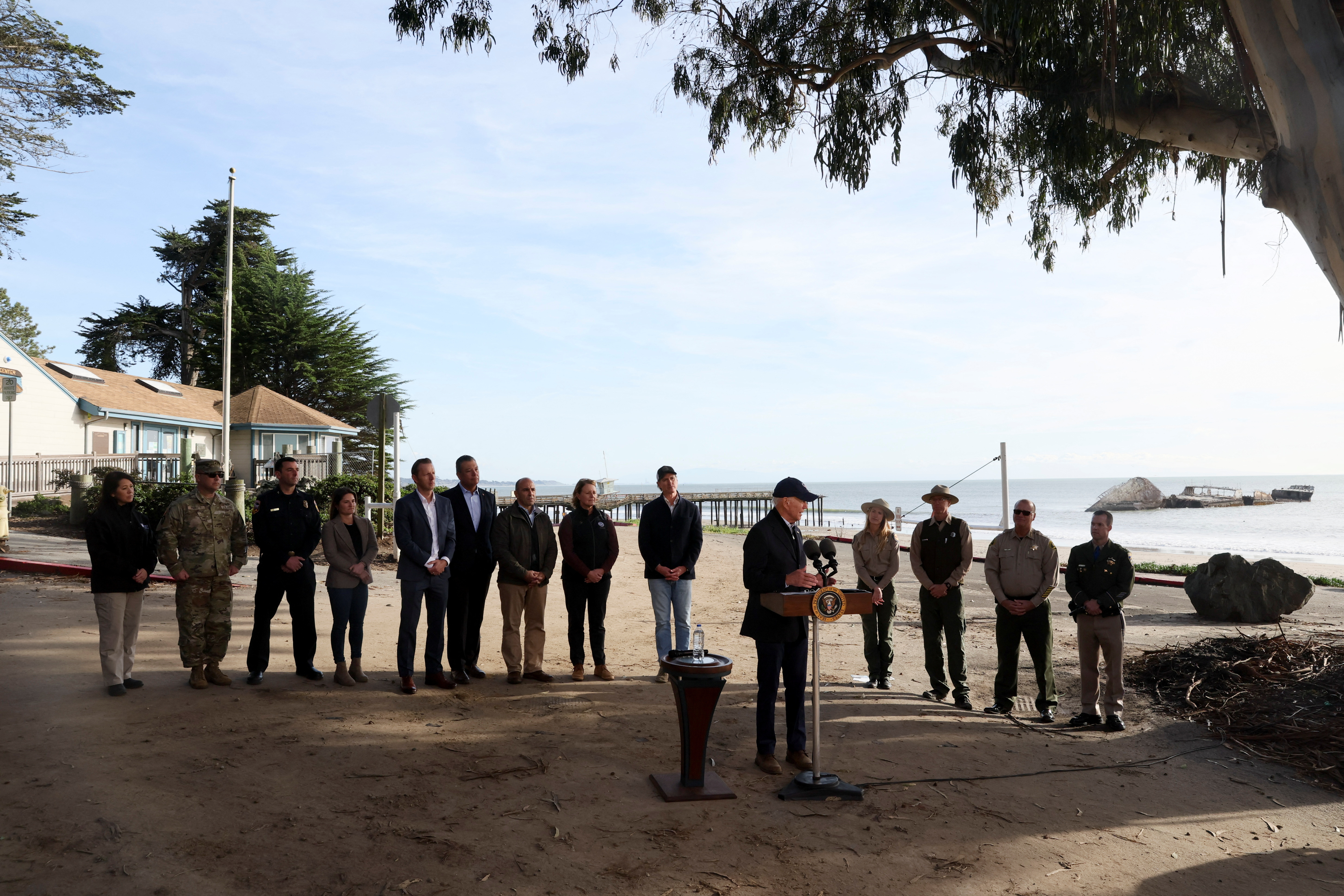Biden highlights climate change as he tours California areas lashed by storms
APTOS, Calif., Jan 19 (Reuters) - U.S. President Joe Biden stressed global warming's role in natural disasters on Thursday as he toured parts of California after three weeks of deadly "atmospheric river" storms inflicted floods and mudslides on a state long plagued by drought and wildfires.
"If anybody doubts that the climate is changing, then they must have been asleep during the last couple of years," Biden said at Seacliff State Beach along the Santa Cruz coastline, where a crumpled pier stood as testament to the destructive force of the recent storms.
"Extreme weather caused by climate change leads to stronger and more frequent storms, more intense droughts, longer wildfire seasons, all of which threaten communities all across California," Biden said.
A year ago, Biden made a similar trip to the scene of one of Colorado's most destructive wildfires on record, a rare winter blaze that he then called a "code red" reminder of an ominously altered climate.
The president, traveling on Thursday with the head of the Federal Emergency Management Agency (FEMA), Deanne Criswell, landed at Moffett Federal Airfield in Santa Clara County, south of San Francisco, and was greeted by Governor Gavin Newsom and other officials.
Biden then flew by helicopter over other storm-stricken locations in Santa Cruz County, where flash floods, pounding surf and runoff from local mountains had forced thousands of residents to evacuate from low-lying communities.
He also paid a personal visit with residents and business owners along the waterfront in Capitola, where the picturesque coastal enclave's wharf lay in ruins, then stopped in nearby Seacliff for brief remarks promising that FEMA teams would stay "until it's all fixed and done."
Earlier this week Biden signed a major disaster declaration authorizing federal recovery aid for several northern and central California counties. He said nearly 150,000 people were under evacuation orders at the peak of the winter storm crisis, and that some 1,400 remained displaced as of Thursday.
Criswell told reporters aboard Air Force One to California that early estimates put property damage at several hundred million dollars statewide, a figure that was expected to rise as further assessments are made.
"California has really experienced some unprecedented storms," she said.
CLIMATE EXTREMES
[1/9]U.S. President Joe Biden delivers remarks as he visits a storm-damaged area in Seacliff State Park, California, U.S., January 19, 2023. REUTERS/Leah Mills Purchase Licensing Rights
At least 20 deaths have been attributed to a three-week barrage of nine storms classified as atmospheric rivers - massive airborne currents of dense moisture funneled in from the Pacific and powered by sprawling low-pressure systems churning offshore.
Experts say the growing frequency and intensity of such storms, punctuating extreme drought, are symptoms of human-induced warming of the planet and make it more difficult to manage California's precious water supplies while minimizing heightened risks of floods and wildfires.
Visiting the disaster stricken state, Biden touted elements of the massive budget reconciliation bill he signed in August designed to bolster critical infrastructure such as levees and power grids against extreme weather, while authorizing $369 billion for climate and renewable energy initiatives.
Some environmentalists have urged political leaders to move even more decisively to phase out greenhouse gas emissions generated primarily from burning fossil fuels, complaining that Biden was forced to make too many concessions to the oil and gas industry to clinch his climate deal.
"Californians don't need another Biden disaster tour. We need action to end the fossil fuels causing the damage," said Nyshie Perkinson, a spokesperson for the nonprofit Center for Biological Diversity.
Torrential downpours since Dec. 26 triggered widespread flooding as well as hundreds of mudslides, rockfalls and sinkholes across the state, swallowing cars, forcing road closures and even disrupting rail travel. Several people died in flooding caused by breached levees along the Cosumnes River south of the state capital, Sacramento, during the first wave of the storms.
Landslide hazards mounted by the week from repeated saturation, with much of the damage greatest in areas below hillsides and canyon slopes that past wildfires had stripped of vegetation and left unstable.
The onslaught of showers, and heavy snow in the mountains, was accompanied by gale-force winds that drove pounding surf into coastal areas, washing out seaside roads and docks and uprooting thousands of drought-weakened trees in rain-soaked soil.
The high winds wreaked havoc on the state's power grid, knocking out electricity to as many as 200,000 Californians at some point during the storms.
Although highly damaging, the storms eased a historic four-year dry spell in California, replenishing some badly depleted reservoirs and the Sierra Nevada snowpack, a critical source of fresh water for the state.
But experts have warned that most of California remains under moderate or severe drought conditions with no assurance that there will be enough precipitation over the remainder of the winter to sustain drought relief.
Sign up here.
Reporting by Jeff Mason in Aptos, Calif.; Additional reporting by Trevor Hunnicutt, Katherine Jackson, and Steve Holland in Washington and Tyler Clifford in New York; Writing and reporting by Steve Gorman in Los Angeles; Editing by Gerry Doyle, Josie Kao, Leslie Adler and Simon Cameron-Moore
Our Standards: The Thomson Reuters Trust Principles.

